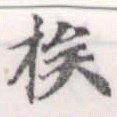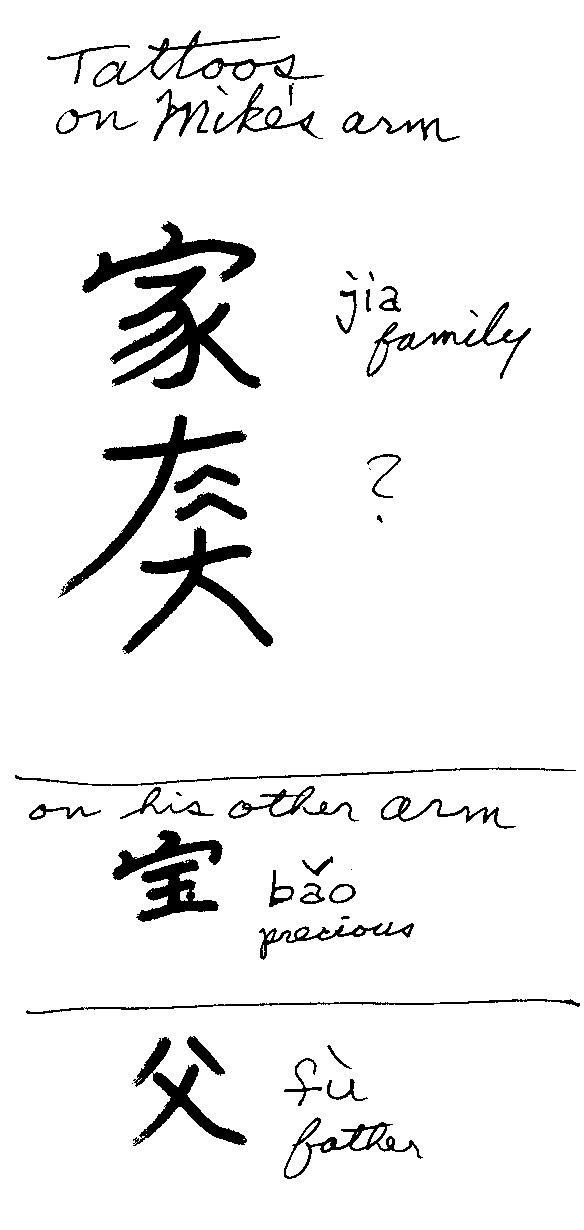Mystery characters and variant characters
« previous post | next post »
Carl Masthay sent in this transcription of tattoos on the arms of a guy he met in a bar last Saturday:
I wrote to some friends asking what they thought the mystery character was. Suggestions received included the tíng 庭 of jiātíng 家庭 (sometimes written as 家廷) ("family; household") and the huo 伙 of jiāhuo 家伙 (sometimes written as 傢伙) ("guy; fellow; chap"). Surprisingly, David Moser and Tom Bishop, separated from each other by half the globe, wrote back to me immediately upon reading my message and within a minute of each other, hazarding that they thought it was the zú 族 of jiāzú 家族 ("clan; household; family"), and I would tend to agree with them.
See the variant forms of the character at the bottom of this page. Unfortunately, none of them match the mystery character very well.
Tom Bishop found slightly similar forms here, though, especially this one:

Many more variants of zú 族 may be found here and here.
All of this brings us squarely into the realm of what are known in Chinese as yìtǐzì 異體字 ("variant characters"). As you can see, the variations are often starkly different from each other and can be extremely numerous, especially for very common and powerful characters. When we get into regional varieties and the intentionally arcane writing of secret societies, cults, the underworld, and other closed groups, the precise identification of certain variants may be next to impossible for outsiders to determine.
We have recently discussed "Weird languages" and stylistic modifications of Chinese characters. In my next post, I'll look into some truly weird characters.
[Thanks to Randy Alexander]

Jayarava said,
July 6, 2013 @ 6:07 am
One of my problems is trying to work out transliterations from Sanskrit in 4th century Chinese Buddhist texts. For example 婆羅門 póluómén is a phonetic rendering of brāhmaṇa (A Brahmin).
But some transliterations remain a mystery, for example: 羅蛾梨木 = Luó é lí wood. In particular, I can find no other use of 蛾 to transliterate Sanskrit, and although 羅 and 梨 are used and might provide clues I'm still none the wiser.
Michael Harrison said,
July 6, 2013 @ 8:00 am
I know this is Language Log, but the folklorist in me asks if Carl Masthay by any chance asked Mike-with-the-tattoos what he thought the meaning of these characters was?
Carl Masthay said,
July 7, 2013 @ 1:48 pm
I'm the one who wrote the tattoo sheet. Several of us ChiLings have settled on jiazú as the correct reading. While talking with Mike when he was showing me the large tattoo, I did ask him what he remembered. He was at a loss and knew only 'family', which does indeed correspond to jiazú, and so he didn't have to know what the second character was. I sent the answered sheet to him thru the bartender woman Emily at Judy's Fireside, an Overland (St. Louis) bar. Mike instructs for the US Army about civil engineering aspects. He's a bit bombastic but good hearted.
To JAYARAVA:
About Luó é lí (Cantonese loh ngoh lei), consider "r"s and "l"s and maybe "langala" or "rangari" 'a fragrant oleander' or "rauhinii, rohinii, rohin" 'sandal tree' or 'Indian fig tree' (Ficus indica etc., Andersonia rohitaki[sp.?]). Not much else. Just my guesses.
Carl
Matt said,
July 7, 2013 @ 6:56 pm
Jayarava: You seem to be handicapping yourself a bit by using modern Chinese pronunciations. I don't know exactly what 蛾 is supposed to have been, but it'd definitely be closer to "(n)ga" than "e".
Incidentally, in this particular case, the 翻梵語 happens to have an entry for the word:
So maybe it's a tree with a name that sounds something like "yaṃghāti" (by analogy with 僧伽梨 = saṃghāti) and literally means "plough"?
Matt said,
July 7, 2013 @ 7:16 pm
(Although this separate claim that the word actually starts with a "耶" really just emphasizes how tangled the chains of transmission can get — especially given that the 翻梵語's "translation" seems to imply the Sanskrit word "langala".)
Mona said,
July 11, 2013 @ 2:31 am
This might sound crazy, but it almost seems like Mike wanted his tattoos to say "Family Guy" and "American Dad" (the titles of two American TV shows).
It sort of works if the mystery character is 伙 and the 宝 was really meant to be 美 or 国.